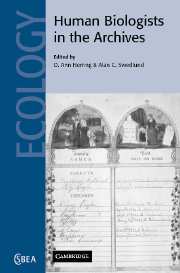 Human Biologists in the Archives
Human Biologists in the Archives Published online by Cambridge University Press: 12 August 2009
History embodies knowledge, tradition, and identity, which are at the core of the human condition. Anthropology has access to a vital record of history represented by the past study of cultures that no longer endure, of languages now extinct, of earlier conditions of health and human biology, and, in general, of the material and written evidence of patterns of existence from the near and distant past. That record is as essential to our understanding of humankind as is the ongoing data collection of the discipline today.
The historical records that incorporate anthropological knowledge consist of many things beyond the finished products that appear in publications: the raw data of research projects; the process of analysis and interpretation that led to published conclusions, contained in notes and worksheets and written drafts; the personal papers of the anthropologists themselves, which give context to the research and document the biographical and social realities of the researchers' lives; and the vast array of materials created by others and for other purposes that anthropologists discover they can mine for use in their own work. What all these things have in common is that they are ‘records’ only by virtue of the fact that someone has saved them and deposited them in archives.
Individual researchers in all the subfields of anthropology have long made use of such records, but until recently the discipline as a whole has had a certain ambivalence toward them.
To save this book to your Kindle, first ensure no-reply@cambridge.org is added to your Approved Personal Document E-mail List under your Personal Document Settings on the Manage Your Content and Devices page of your Amazon account. Then enter the ‘name’ part of your Kindle email address below. Find out more about saving to your Kindle.
Note you can select to save to either the @free.kindle.com or @kindle.com variations. ‘@free.kindle.com’ emails are free but can only be saved to your device when it is connected to wi-fi. ‘@kindle.com’ emails can be delivered even when you are not connected to wi-fi, but note that service fees apply.
Find out more about the Kindle Personal Document Service.
To save content items to your account, please confirm that you agree to abide by our usage policies. If this is the first time you use this feature, you will be asked to authorise Cambridge Core to connect with your account. Find out more about saving content to Dropbox.
To save content items to your account, please confirm that you agree to abide by our usage policies. If this is the first time you use this feature, you will be asked to authorise Cambridge Core to connect with your account. Find out more about saving content to Google Drive.